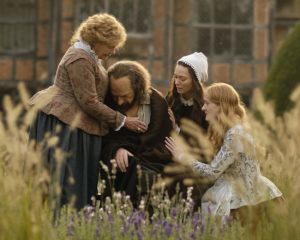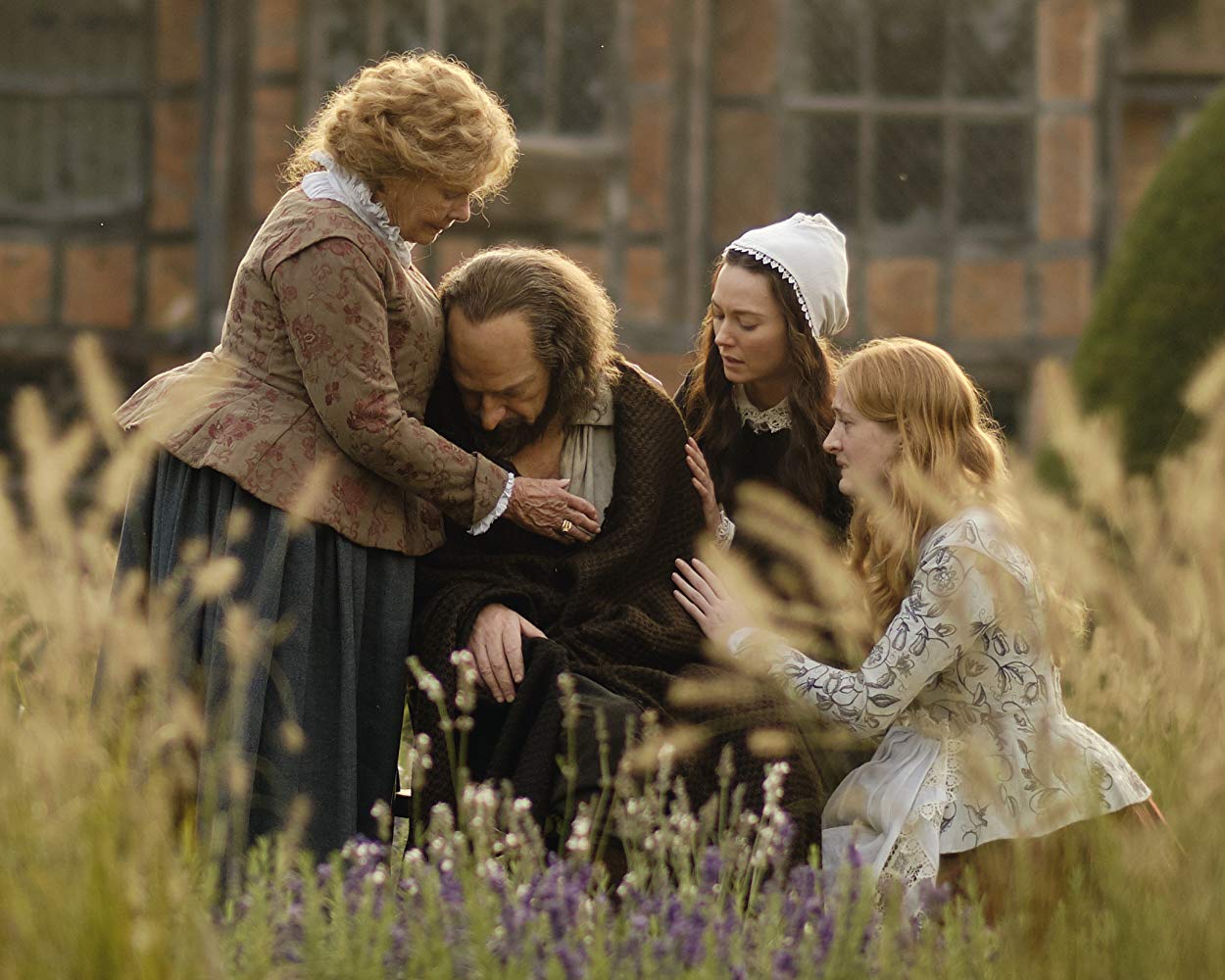Movie Info
Movie Info
- Director
- Kenneth Branagh
- Run Time
- 1 hour and 41 minutes
- Rating
- PG-13
VP Content Ratings
- Language
- 1/10
- Sex & Nudity
- 1/10
- Star Rating
Relevant Quotes
Husbands, love your wives and do not be harsh with them. Children, obey your parents in everything, for this pleases the Lord. Fathers, do not embitter your children, or they will become discouraged.

Directing from a literate script by Ben Elton, long-time Shakespeare enthusiast Kenneth Branagh both directs and stars in this story of the last three years of the Bard’s life. Although mostly conjecture, the historic record being so sketchy, the story, tinged with a bit of modern feminism, is a touching one of family hostility, guilt, and reconciliation, with a coda of mystery and revelation. I am puzzled that so many American critics have panned it, whereas the couple of British reviews that I have read have praised it.
The film begins in the spring of 1613 with a shot of night-time London, Shakespeare’s figure partially lit by the fire that is consuming the Bard’s Globe Theater. His play Henry VIII had just begun, and the screen text reminds us that the play was also known as “All Is True.” A prop canon had misfired, setting ablaze the curtains and props. We are also informed that he never again wrote a line of drama or poetry.
Unable to finance the rebuilding of the Globe, Shakespeare returns to his spacious home in Stratford-on-the-Avon where live his wife Anne Hathaway (Judith Dench) and two daughters, Susanna (Lydia Wilson) and Judith (Kathryn Wilder). Theirs is not at all a warm “welcome home.” When he and Anne mount the stairs, Anne makes plain to him that they will be occupying separate bedrooms.
All three women have felt abandoned by him. During his career his visits to home were few and far between. Anne was stung by his love poetry, obviously not directed to her, and when their 11-year-old son Hamnet had died 17 years earlier, he had not come back to grieve with her. Later, when he tries to assure her that he too grieved their loss, she will bitterly reproach him with the reminder that he nonetheless wrote a comedy, “The Merry Wives of Windsor,” during this period.
The writer has two projects he hopes to complete—the creation of a graveside garden in memory of Hamnet, and the birthing by one of his daughters of a male heir. But overshadowing these goals is the specter of his dead son, appearing at various places in and around the house—especially near the pond where the boy loved to play. Thus Shakespeare is in the opposite position of his protagonist Hamlet, this time it is the father who is haunted by the son.
Part of the father’s grief is over what might have been. Whereas Anne is illiterate and the girls are domestically occupied, Hamnet seemed to have possessed the latent talent to follow in his father’s literary footsteps. Shakespeare treasures several sheets of paper of poems the boy had sent him. He frequently unfolds and rereads them for consolation.
The retired writer must deal not only with his wife’s hostility but of unmarried Judith’s feeling that her father had wished that she instead of her twin Hamnet had died. (Shades of the surviving brother in Ordinary People!) She harbors a shocking secret, becoming so angry with her father in one scene that she snatches the sheets of Hamnet’s poetry from his hands and tosses them into their fireplace. It is during her raging over his preference for her brother that the theme of feminism arises.
The other sister, Susanna, is married, but unhappily, to a Puritan named John, and her suspicious behavior leads to a village-wide scandal that torments her father. There are some in the village jealous of his fame and great reputation who would gladly see his name dragged through the mud. The Elizabethan Age with its looser sexual mores is giving way to that of the Puritans and their straight jacketed values.
To some the best scene is the lively one, shot mainly in closeups, involving the visit to Shakespeare by his old patron the Earl of Southampton (Ian McKellen), whom some scholars think was the inspiration for Shakespeare’s love poetry. The nobleman acknowledges him as the greatest of Englishman, but makes very clear that they still are of unequal social rank. At this point we see that Shakespeare is as ambitious to increase his status as any other man of his time. Also, Will recites part of his 29th sonnet: “For thy sweet love remembered such wealth brings / That then I scorn to change my state with kings,” intimating that he still harbors romantic feelings—which at that time had to be kept hidden. The Earl recites them back, but his rendering is very different in tone—he has moved on with his life. The two part on friendly terms, but this does not include social equality or mutual romantic feelings.
Much as I appreciated this beautiful scene, I enjoyed even more the resolution of the conflict and the surprising revelations that resulted when Anne and Judith revealed their secrets. Their revelations are stunning to Will, but lead to the healing of old wounds. The reconciliation of the three was inspiring to watch, and I don’t think it is spoiling things to say that “All’s well that ends well.” It was especially a joy to see Anne, after so many years of illiteracy, able at last to take quill in hand and do something she had not been able to do before.
My first thought while leaving the theater and still feeling its charm was that if this speculative story were not the way that the great writer’s life ended, then it well should have been.
This review will be in the July issue of VP along with a set of questions for reflection and/or discussion. If you have found reviews on this site helpful, please consider purchasing a subscription or individual issue in The Store.

